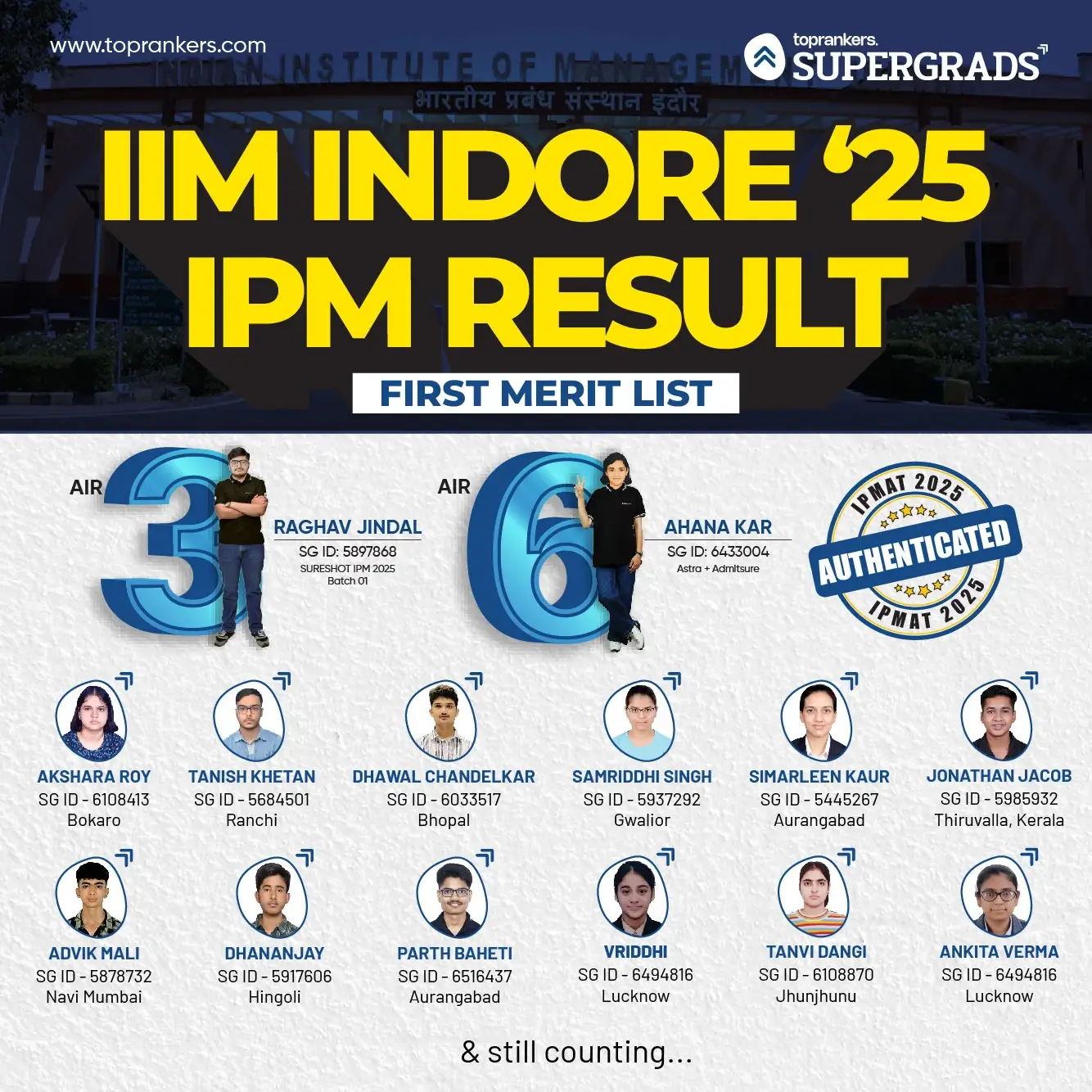Best Ways to Improve Quantitative Aptitude for BBA Entrance Exam 2026
September 18, 2025
Overview: Quantitative Aptitude is the key to cracking any BBA entrance exam. This article explores the Ways to Improve Quantitative Aptitude for BBA Entrance Exam through proven strategies and practices recommended by our expert faculty.
Does quantitative aptitude give you the creeps? If yes, then this article equips you to ace QA preparations.
Quantitative aptitude involves solving numerical difficulties. Regardless of your academic background, you need to understand the quantitative ability to clear BBA entrance exams.
If you know maths, quant can be high-scoring. However, many non-math students have also gotten excellent grades in the subject using easy strategies. Continue reading to discover the quantitative section tricks used by high scorers.
Best Ways to Improve Quantitative Aptitude for BBA Entrance Exams 2026
Before talking about these tips, how about you trying to figure out one tip that you think might help you in a better way? If yes, that would be a bonus, or these practices will help you improve your quantitative aptitude.
1 - Accept Numbers
- In Quantitative Aptitude, you’ll encounter complex numerical problems. Embrace numbers as your allies.
- Start with the basics and review relevant mathematical formulas.
- Practice handling large numbers and complex formulas.
- Consistent practice leads to efficiency in solving numerical problems.
Check: Alternative BBA Entrance Exams with IPMAT 2026
2 - Rely on Shortcuts and Techniques
- Entrance exams demand efficient problem-solving.
- Upgrade from old-school methods.
- Learn shortcuts and tricks to save time.
- SuperGrads channel offers sessions on solving various question types with simple and efficient tricks that help you solve problems faster.
For example:
Crisscross System of Multiplication:
For 2-digit × 2-digit multiplication:
Multiply the digits in the one's place.
Cross-multiply and add the products.
Retain the units digit of the cross multiplication
Add the tens digit of the multiplication to the product of digits in the tens place
Example: 43 × 12:
- 3 × 2 = 6 (ones place)
- (4 × 2) + (3 × 1) = 11 (tens place)
- 4 × 1 = 4
- 1 + 4 = 5
- Final result: 516.
3 - Time Management
- Manage your time effectively during the exam.
- Most exams consist of 60 questions to be answered in two hours.
- Allocate approximately 2 minutes per question.
- Be strategic in your decisions due to negative marking for incorrect answers.
- Prioritize questions you are confident about.
- Leaving out uncertain questions is better than risking incorrect answers.
Check: Preparation Strategy for BBA Entrance Exams in India
4 - Speed with Accuracy
- Being fast is essential to cover all 60 questions.
- However, avoid rushing through questions.
- If unsure, skip a question without hesitation.
- Mark answers consciously to avoid mistakes.
- Rushing can lead to incorrect answers despite knowing the right solution.
5 - Practice and Mocks
- Regular practice lightens the burden.
- Consistency is crucial, especially for challenging topics like mathematics.
- Mock tests provide valuable insights into your progress.
- Attempt at least two mocks per week.
These tips are considered some of the best tips for improving quantitative aptitude for the BBA entrance exam. However, you should also adopt the best practices that help you based on peer and faculty feedback.
Check: Quantitative Aptitude Questions for BBA Entrance Exam
Common Topics of Quantitative Aptitude for BBA 2026
Provided below is a comprehensive table with common topics in Quantitative Aptitude for BBA entrance exams:
| Topic | Description |
| Number Theory | Concepts related to integers, prime numbers, divisibility, and factors. |
| Logarithms | Understanding logarithmic functions and their properties. |
| Square Roots | Calculating square roots of numbers. |
| Fraction and Decimals | Operations with fractions and decimals. |
| HCF and LCM | Finding the highest common factor (HCF) and least common multiple (LCM) of numbers. |
| Commercial Math | Applications of percentages, profit and loss, interest, and discounts. |
| Data Sufficiency Test | Analyzing data to determine if it’s sufficient to answer a question. |
| Algebra | Solving equations, inequalities, and understanding algebraic expressions. |
| Alligations and Mixtures | Problems related to mixing different components. |
| Area | Calculating areas of geometric shapes (rectangles, triangles, circles). |
| Problems on Age | Solving problems related to age and time. |
| Averages, Mean, Median, Mode | Understanding central tendencies in data. |
| Boat Problems | Solving problems related to boat speed and river currents. |
| Work and Wages | Calculating work done by individuals or groups. |
| Permutation and Combination | Counting arrangements and selections. |
| Profit and Loss | Understanding profit, loss, cost price, and selling price. |
| Probability | Analyzing the likelihood of events occurring. |
| Percentages | Calculating percentages and percentage changes. |
| Ratios | Solving problems involving ratios and proportions. |
Practise Questions based on Time and Work
Quantitative Aptitude for BBA: Things You Should Avoid While Preparing for Quantitative Aptitude 2026
If you are preparing for competitive exams like CUET or IPMAT, you need to be fast in order to maximize your chances of selection. Here are some points that you should avoid if you want to score higher in Quantitative Aptitude -
- Never rely on conventional methods - Conventional methods of problem-solving are usually what we were taught in schools. While these methods are straightforward, we don’t have enough time to solve each problem using these techniques.
- Never miss any concept - Clearing concepts in quantitative aptitude is very important. Students skip some concepts, thinking that’s too easy or tough. This is a mathematics exam; and henceforth, any concept can be combined with another to frame a new question.
- Never ignore the fundamentals - Even advanced mathematics requires a fundamental understanding of concepts. Skipping the basics and diving straight into advanced topics, especially in mathematics, will likely leave you confused and unable to understand anything.
We hope these points are clear to you, along with the tips to enhance your Quantitative Aptitude for BBA entrance exams. Be sure to steer clear of these mistakes to excel in your examinations.
To ace the Quantitative Aptitude section, you will have to follow these basic tips with sincerity.
Quantitative aptitude has a decent weightage in the entrance exams, so you must prepare well.
You can avail of the coaching at SuperGrads to overcome any difficulty with preparation, where you will be taught by one of the best faculties in the field.
Check: BBA Entrance Exam Books
Key Takeaways
- Quantitative Aptitude (QA) is a crucial section in BBA entrance exams, and this article highlights effective Ways to Improve Quantitative Aptitude for BBA Entrance Exam, along with essential practices recommended by expert faculty to strengthen QA skills.
- Rely on shortcuts and techniques to solve problems efficiently, such as the crisscross system of multiplication, which can save time during exams.
- Time management is crucial during exams, with approximately 2 minutes allocated per question and strategic decision-making to avoid negative marking for incorrect answers.
- Speed with accuracy is emphasized, highlighting the importance of being fast yet cautious to minimize mistakes while attempting all 60 questions within the allotted time.
- Regular practice, consistency, and mock tests are essential for improving QA skills and gaining valuable insights into one's progress.
- The article provides a comprehensive list of common topics in QA for BBA entrance exams, covering number theory, logarithms, algebra, percentages, probability, and more.
Frequently Asked Questions
Is BBA good for the future?

What corporate roles can I pursue with a BBA?

How can BBA entrance exam sample papers benefit me?

Can solved question papers help me understand the types of questions that are commonly asked in the BBA entrance exam?

Can solving BBA entrance exam sample papers help me manage my time better during the actual exam?






SHARE